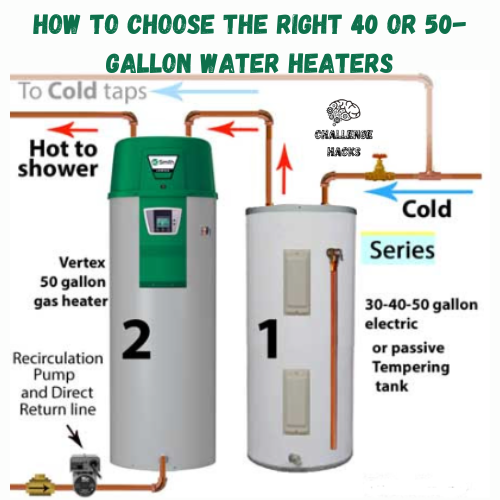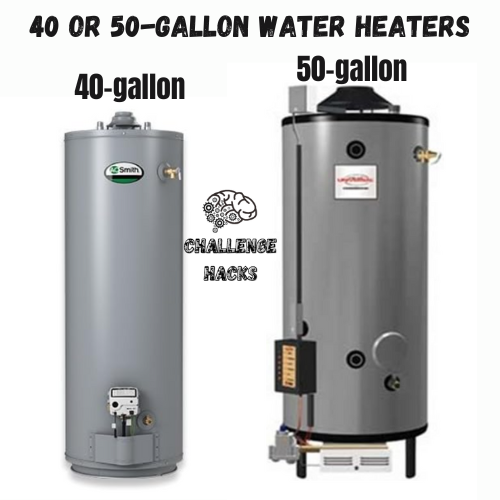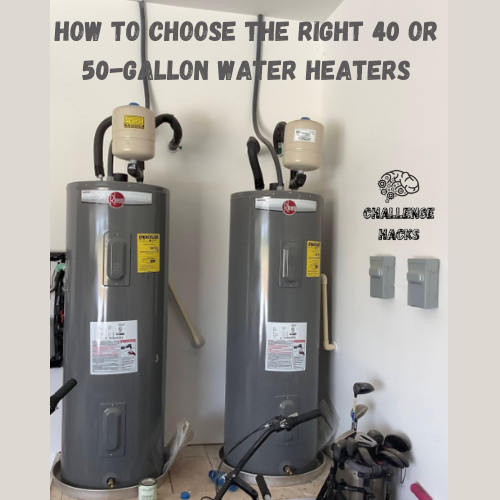
Hot water is a daily necessity, whether for a refreshing shower, dishwashing, or laundry. In the quest for an appliance that seamlessly caters to your needs, the challenge lies in selecting the perfect-sized water heater for your abode. So, how does one navigate the landscape of water heaters to find the ideal match that not only meets but exceeds the demands of your daily life? In this article, we will compare the pros and cons of 40 or 50-gallon water heaters, and help you decide which one is best for you.
What is the Difference Between a 40 or 50-gallon Water Heaters?
The main difference between a 40 or 50-gallon water heaters is the capacity and the first-hour rating. The water tank’s prowess lies in its capacity, defining the reservoir’s volume, while the inaugural-hour prowess is the heater’s virtuosity in delivering hot water during its first hour of operation. This inaugural-hour prowess, a harmonious interplay of capacity, recovery rate, and water temperature rise, intricately shapes the unique signature of each water heater.
Compared to a 50-gallon water heater, a 40-gallon water heater is smaller in capacity and has a lower first-hour rating. This implies that during the first hour, it may hold less water and give less hot water. That does not, however, imply that it is insufficient or inferior. A small to medium-sized household’s hot water needs can still be satisfied by a 40-gallon water heater as long as usage is spaced out rather than occurring all at once.
In the realm of water heaters, the distinction is vivid: a 50-gallon behemoth surpasses its 40-gallon counterpart in both capacity and inaugural-hour prowess. The 50-gallon powerhouse not only accommodates more water but also unleashes a greater surge of hot water in the initial hour. Tailored for the demands of sizable households or those with elevated peak-hour needs, it stands as the quintessential choice, effortlessly meeting the challenge of simultaneous showers or multiple appliances in full operation.

How to Determine Your Hot Water Demand?
You must determine your hot water demand to select the appropriate water heater size for your house. This is how much hot water your household uses on average each day. By totaling up the gallons of water used by all of the fixtures and appliances in your house—including washing machines, dishwashers, showers, and faucets—you can determine your hot water demand. The following table provides an average water usage for popular household appliances and fixtures.
| Fixture or Appliance | Average Water Usage (gallons) |
|---|---|
| Shower | 10 – 25 |
| Faucet | 2 – 5 |
| Dishwasher | 4 – 6 |
| Washing Machine | 7 – 12 |
Each entry in this distinctive table unveils the unique water footprint, inviting you to explore the nuanced consumption patterns of these essential elements in your daily routine. For example, if you have a family of four, and each person takes a 10-minute shower, uses the faucet for 5 minutes, and runs one load of dishes and laundry per day, your total hot water demand would be: Unlock the mystery of 140 gallons through this bespoke equation: (4 x 10 x 2.5) + (4 x 5 x 0.5) + (4 + 10). Dive into the intricacies of this calculation, where each element holds a unique key to unraveling the enigmatic sum.
For optimal hot water satisfaction, aim for a water heater with a first-hour rating of at least 140 gallons. However, this is an estimate; actual demand varies based on lifestyle, preferences, and habits. Consider climate, water temperature, and energy source for heater efficiency.
Pros and Cons of 40 or 50-gallon Water Heaters
40-gallon Water Heaters
Pros
- Opt for cost-effectiveness with a 40-gallon water heater, boasting lower upfront and operating expenses compared to its 50-gallon counterpart. Enjoy savings not only on purchase, installation, and maintenance but also on energy bills, thanks to its lower electricity or gas consumption.
- Experience space efficiency as the 40-gallon unit is smaller and lighter, facilitating easy installation in confined areas like basements, garages, or closets. For those with limited space, the 40-gallon water heater proves to be a more practical choice.
- Embrace an eco-friendly stance with the 40-gallon water heater, contributing to reduced energy and water usage compared to the 50-gallon variant. To enhance environmental performance, consider opting for a high-efficiency or Energy Star-certified 40-gallon water heater, further amplifying your energy savings and reducing your carbon footprint.
Cons
- Limited hot water supply is a challenge with a 40-gallon water heater, as it possesses lower capacity and a reduced first-hour rating compared to a 50-gallon counterpart. This translates to quicker depletion of hot water and longer recovery times. For households with a large family or high peak-hour demands involving multiple fixtures or appliances simultaneously, a 40-gallon water heater might struggle to meet your needs.
- Additionally, there’s a lack of flexibility with a 40-gallon unit, especially when anticipating changes or increases in hot water demand. If you plan to expand your household, add more fixtures or appliances or desire extended and more frequent showers, a 40-gallon water heater may fall short. This could necessitate an upgrade to a larger size or a transition to a tankless water heater, incurring potential costs and inconveniences.
50-gallon Water Heaters
Pros
- Greater hot water supply: Compared to a 40-gallon water heater, a 50-gallon water heater has a larger capacity and a higher first-hour rating, which allows it to replenish more quickly and give more hot water in the first hour. A 50-gallon water heater may supply enough hot water for a big family or high peak hour demand, even if many fixtures or appliances are used simultaneously.
- Greater adaptability: A 50-gallon water heater can accommodate future adjustments or rises in your hot water requirements. A 50-gallon water heater can meet your needs if you want to take longer or more frequent showers or add more fixtures, appliances, or people to your house. You can also adjust the temperature setting of your water heater to suit your preferences and save energy.
Cons
- Prepare for a heftier investment with a 50-gallon water heater – not only does it come with a higher upfront cost, but it also incurs increased operating expenses. From the initial purchase to installation, maintenance, and higher energy bills due to its elevated electricity or gas consumption, the 50-gallon variant demands a more substantial financial commitment.
- Navigating limited space becomes a challenge with the larger and heavier 50-gallon water heater, complicating installation in confined areas such as basements, garages, or closets. If space is at a premium, the 50-gallon option may not be the most practical choice.
- Embrace a less eco-friendly stance with the 50-gallon water heater, as it utilizes more energy and water, amplifying your environmental impact and carbon footprint. While a high-efficiency or Energy Star-certified 50-gallon unit can mitigate some of these effects, it still falls short of the eco-friendly benchmarks set by a 40-gallon water heater.
Y0U MAY LIKE THIS Top 10 Most Efficient Electric Water Heaters
How long does it take for a 40 or 50-gallon water heater to heat up?
The time it takes for a 40 or 50-gallon water heaters to heat up depends on various factors, including the specific model, the initial temperature of the water, and the power source (electricity or gas). Generally, it can take anywhere from 30 minutes to 1 hour for a water heater to heat up and reach its set temperature. Newer models equipped with faster recovery rates may heat up more quickly than older units. It’s essential to consult the manufacturer’s guidelines and specifications for the particular water heater y0u have to get accurate information on heating times.
How long does a 40 or 50-gallon water heater last?
The quality, upkeep, and use of a water heater determine how long it will last. Due to their smaller moving parts and reduced corrosion, electric water heaters often have a longer lifespan than gas water heaters. The average lifespan of a gas water heater is 8 to 12 years, whereas that of an electric water heater is 10 to 15 years. The quality of the water, how often you flush, how often you change your anode rods, and how well you seal leaks can all affect this.
How much does it cost to install a 40 or 50-gallon water heater?
The type, size, and location of the water heater, in addition to the labor and supplies needed, all affect the installation cost. Due to the need for gas lines and venting, installing a gas water heater often costs more than installing an electric water heater. The average cost of installing an electric water heater is $300 to $700, whereas the average cost of installing a gas water heater is $800 to $1,500. However, this can change based on the installation’s intricacy, local prices, and the necessary permits and inspections.
How much does it cost to run a 40 or 50-gallon water heater?
A 40 or 50-gallon water heaters operating costs are determined by many variables, such as the energy source (gas or electricity), local utility prices, and the energy efficiency of the heater. In general, gas water heaters are less expensive to operate than electric ones. A water heater’s monthly operating costs might vary from $20 to $50 on average. These are only approximate costs, though, and real expenses may differ depending on consumption habits, local energy costs, and the water heater’s particular efficiency. Check your utility bills and refer to the manufacturer’s data on energy use for your particular model for a more precise estimate.
How can I save energy and money with a 40 or 50-gallon water heater?
To save energy and money with a 40 or 50-gallon water heater, consider the following tips:
Adjust the Temperature: Set the water heater thermostat to a lower temperature, typically around 120°F (49°C). This reduces energy consumption while still providing sufficient hot water.
Install a Timer: Use a timer to schedule the water heater to operate during periods of high demand, such as mornings and evenings, and turn it off during times of low or no usage.
Insulate Your Water Heater: Wrap the water heater with an insulating blanket to minimize heat loss, especially if the heater is located in a cool or unheated space.
Fix Leaks: Address any leaks promptly, as even small drips can result in energy and water waste.
Consider a Tankless Water Heater: Tankless or on-demand water heaters only heat water when needed, eliminating the standby energy losses associated with traditional tank-style heaters.
Regular Maintenance: Flush the tank periodically to remove sediment, which can reduce the efficiency of the water heater.
Upgrade to High-Efficiency Models: When it’s time for a replacement, consider investing in a high-efficiency or Energy Star-certified water heater, which can significantly reduce energy consumption.
Use Cold Water for Laundry: Wash clothes in cold water to reduce the demand on the water heater.
By implementing these strategies, you can enhance the energy efficiency of your 40 or 50-gallon water heater, leading to savings on both energy bills and overall operational costs.
Conclusion

Choosing the ideal water heater involves a careful balance. A 40-gallon unit suits small to medium households, offering affordability, space efficiency, and eco-friendliness, albeit with a lower hot water supply and flexibility. In contrast, a 50-gallon heater suits larger households, providing ample hot water and flexibility, but at a higher cost, space requirement, and environmental impact. Consider the nuances of electric vs. gas heaters, factoring in costs, lifespans, and recovery rates. Opt for high-efficiency or Energy Star-certified models for long-term energy and cost savings. Regular maintenance, temperature adjustments, insulation, tank flushing, and anode rod replacement enhance lifespan and performance. Navigate these considerations wisely to find the perfect 40 or 50-gallon water heater for your home. Thank you for reading! 😊